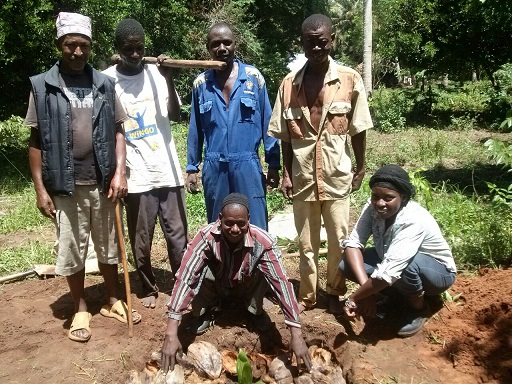-
About
- Our Work
- Get Involved
- Stay Updated

Agriculture in essence is Life. The future and survival of mankind arguably can be said to be influenced by agriculture on both a positive and negative perspective. Agriculture is said to be the back bone of Kenya’s economy where I was born and bred. In my opinion achieving most of the SDG's especially 1 and 2 can be achieved through Agriculture. My reality on this importance for me came up at the end of my second year of study at Egerton University in Njoro 18km from Nakuru town in Kenya. I did my primary and secondary in Nairobi the capital of Kenya where I was raised. Nairobi is an urban concrete ‘jungle’ and there isn’t much land for farming unless on the outskirts. I for one succeeded in passing my Kenya Certificate of Secondary Education National Exams and was among the few selected by the joint admissions board to study Bsc. Agriculture at Egerton University (A public University).‘‘I therefore fell into the statistic of falling into Agriculture by chance and not choice’’. This could be seen as a case of city ‘Girl’ gone to the country side.
I nearly failed my study due to my negative attitude. However a lengthy conversation with my academic advisor led to the journey that I am now in. This coupled with hard work and effort, a definite change of attitude. To discovering interest in Soil Sciences, Agricultural Experimentation and Agronomy to my graduating amongst the top in my class with one point shy of 70 % required for a first class honors in my 4th year form a below average 40 % in my 2nd year. I then graduated with a second class honors (upper division).
My appreciation and drive to learn more in my profession grew with each day being a lesson. Case in poin I love training and public speaking. I decided to work in extension with small scale farmers in rural communities in different parts of Kenya. This is so as to better understand the situations our farmers are in. In order to get a glimpse of the daily practices, learn from their experience but also improve on what they already know for better management. The small scale farmers is of particular interest to me as I would not like to be a ‘paper scientist’ but a practical scientists whose ideas and innovations are adaptable and can be implemented by the small scale farmers; and that have lasting sustainable effects. I therefore look forward to starting my MSc. soon. I am a mentee in a 12 month mentorship programme with ypard and I have also been lucky enough to work with organizations that promote conservation agriculture through proper management practices and organic farming, that influence the small scale farmer directly through advice and markets therefore improving their livelihoods through increased production ergo improved household incomes including selling of surplus. There is direct economic and social impact in the family through agriculture; visibly through increased nutrition and education as a result of increase in household income.
Why then are youth not engaging in agriculture? In as much as it is important in understanding aspects of Decent Rural Employment and Gender and Land Tenure . There is vast opportunity in agribusiness, entrepreneurship and not to mention the gap in extension education that is in desperate need of personnel; ICT for development as an attractive tool. Close to 70 percent of poor live and work in the rural areas. This in itself can be seen as an opportunity for growth which needs to be curbed to control issues as rural-urban migration. Labor which is an asset that rural youth possess needs to be harnessed into as the obvious direct socio-economic impact agriculture has in improved rural livelihoods and greater futures goes unsaid. My interest in the GCARD3 5 themes is definitely ‘‘ensuring better rural futures’’ Having worked in extension education in the rural areas I am motivated and apart from being a ‘realistic’ scientist. I have seen opportunity and I’m engaged agricultural entrepreneurship making change in filling the gap that i.e. extension education through information dissemination.
This blog post is part of the GCARD3 Youth blogpost applications. The content, structure and grammar is at the discretion of the author only.
Tags:About the author
Related Posts
Comments
No comments made yet. Be the first to submit a commentBy accepting you will be accessing a service provided by a third-party external to https://ypard.net/
Get in touch
Email: [email protected]
YPARD Global Coordination UnitHosted by AGRIDEA and the Czech University of Life Sciences Prague
Lausanne, Switzerland and Prague, Czech Republic - Our Work


